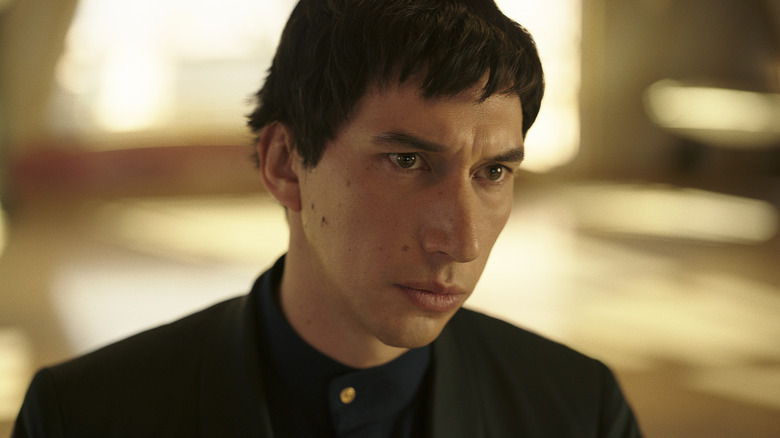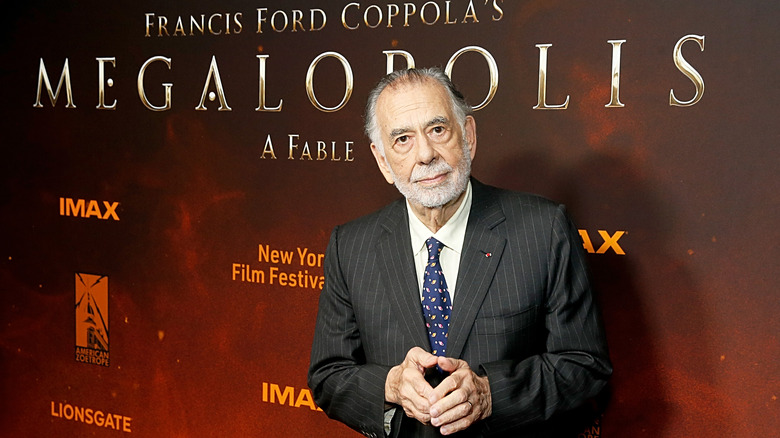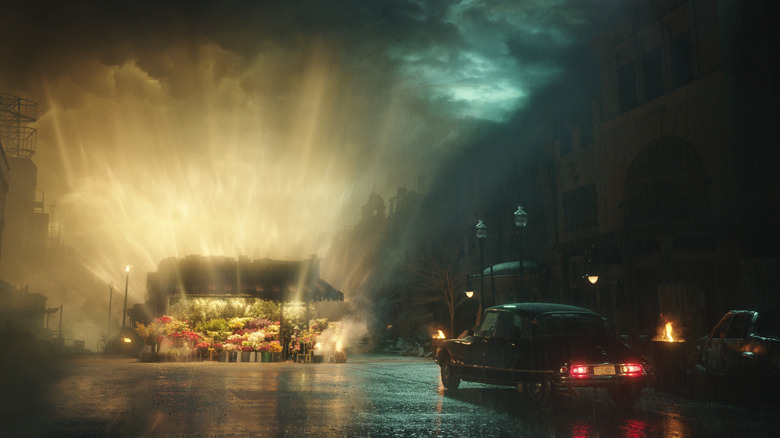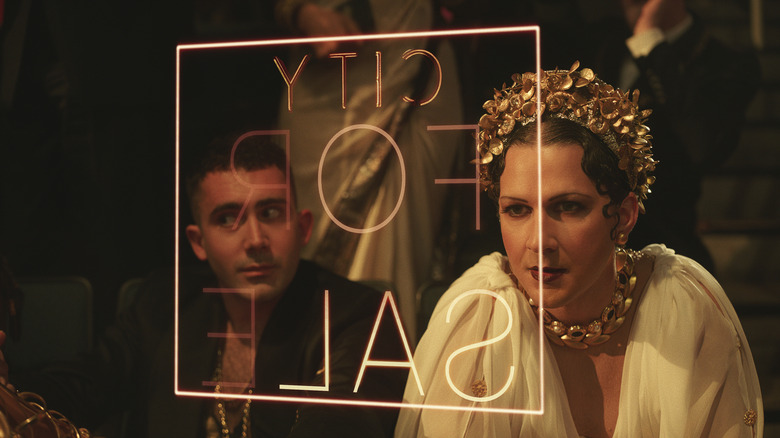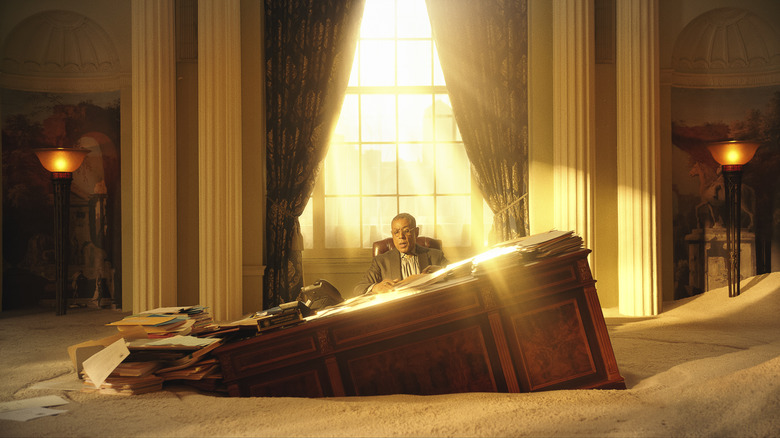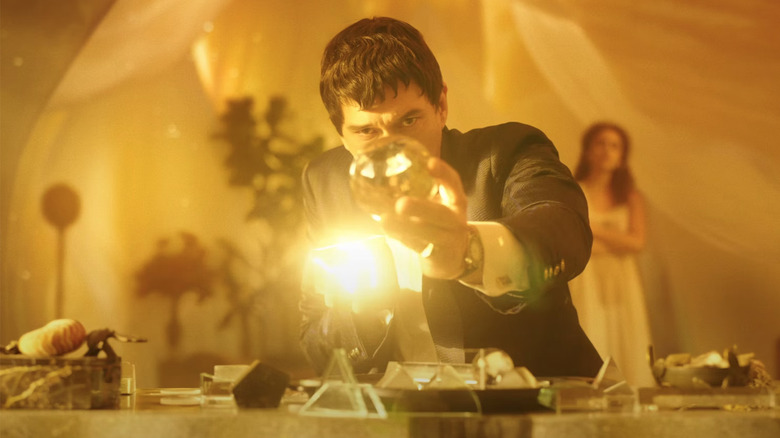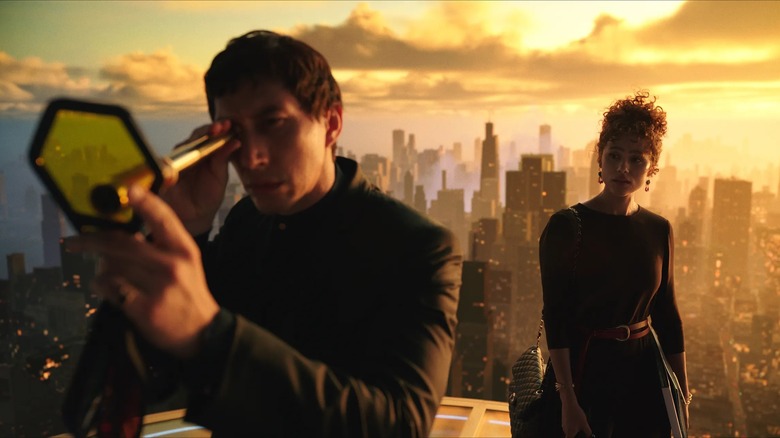Why Megalopolis Bombed At The Box Office
When no studio wanted to make the retrofuturist architectural drama/Roman history fable "Megalopolis," Francis Ford Coppola sold off part of his wine business to help fund the passion project, which cost between $120 and $136 million, according to reports. Now that the long-in-the-works epic has finally been unleashed, it's easy to see why studios didn't want to make it: "Megalopolis" failed to capture the imagination of movie-goers, and those who have seen it mostly don't care for it. The opening weekend gross came out to an estimated $4 million, even lower than initial projections of a $5-7 million weekend.
Coppola and his defenders are sure to argue that the film is a misunderstood masterpiece. "Misunderstood" is an easy enough argument to make for a film so hard to follow that nobody can confidently say they understand it. "Masterpiece," however, is questionable. Regardless of where you fall on the debate about the artistic merits of "Megalopolis," it is unquestionably a commercial disaster — and one that was easy to see coming, based on everything known about its troubled history, baffling content, constant controversies and the overall bad press leading up to its release. Let's examine all the factors that turned "Megalopolis" into a mega flop.
Francis Ford Coppola hasn't had a hit in decades
Aside from Christopher Nolan, Jordan Peele, and James Cameron, how many directors can guarantee a hit on their name alone these days? Even Steven Spielberg isn't a sure thing after "West Side Story" and "The Fabelmans" bombed despite excellent reviews. Martin Scorsese has to rely on streaming services to get his movies made. Yet marketing for "Megalopolis" centered almost entirely around Francis Ford Coppola — a director once held in the same esteem as Spielberg and Scorsese but who hasn't had nearly the same success in his later career.
Coppola made his best films in the 1970s: His run of "The Godfather," "The Conversation," "The Godfather Part II," and "Apocalypse Now" remains the stuff of legend. His work in the '80s and '90s, however, was more inconsistent. For every solid hit like "Bram Stoker's Dracula," there's a disastrous release to match. In fact, "Megalopolis" isn't the first time he's put up his own money to fund an ambitious utopian tale on the big screen and got burned — the same thing happened with 1981's "One From the Heart," which also flopped at the box office.
His reputation took a hit and has never really recovered. As such, Coppola isn't frequently on the minds of younger casual moviegoers, and older moviegoers have good reason to approach his grand return to directing after 13 years away with some degree of skepticism. If "Megalopolis" was to have any chance of success, it would need to succeed on its own merits, and that hasn't happened.
Working on the script for 40+ years left it a mess
Francis Ford Coppola first conceived of "Megalopolis" in 1977 as a four-part operatic experience. He got serious about developing the idea into a movie in 1983, and tried to produce it on and off over the next four decades. One would hope such extensive work would allow Coppola to perfect his ideas into a masterpiece. Instead, the final result is a mess, packed with too many weird concepts that can't possibly add up.
Why does Cesar Catilina (Adam Driver) freeze time, and what purpose does this power serve him as an architect? Why does he quote all of Hamlet's "to be, or not to be" speech? What's the point of the Russian satellite crashing into New Rome if the aftermath is never addressed? Is Megalon made from Cesar's dead wife, or the power of love, or what? What does Megalopolis actually do aside from look like one of those "The World If..." memes? Some of these questions were answered in older versions of the script. A leaked early draft gives clearer explanations of Megalon (it's made from garbage) and Megalopolis (a place where debt is eliminated and technology eliminates the need for labor, leaving people free to pursue their passions).
The finished "Megalopolis" feels like an incoherent grab-bag of scenes written at different points in history: The Cold War, 9/11, the Trump administration. If the script itself wasn't messy enough, Coppola had his actors improvise many scenes, which might well have contributed to the jarring tonal differences: It sometimes feels like the characters are in completely different movies.
That huge budget wasn't on the screen
Even with its narrative and tonal problems, one would think a science fiction movie from a visionary auteur that cost between $120 and $136 million to make would at least be amazing to look at. And yes, "Megalopolis" does contain some stunning imagery, particularly in the montages where Cesar is tripping on acid and having his shot-up face rebuilt with Megalon. And yet these moments of Fritz Lang-esque grandeur don't appear as often as one would hope. For large chunks of the runtime, "Megalopolis" alternates between blandly staged dialogue scenes and some of the most amateurish-looking green screen and CG effects to ever appear in a major theatrical release.
When an effects-heavy visual wonder like "Poor Things" can be made for just $35 million, what excuse does Francis Ford Coppola have for "Megalopolis" looking so cheap? Turns out much of that money never actually made it to screen. Halfway through production, the director fired his entire visual effects team, and members of the art department resigned soon after that. According to multiple sources working on the production, Coppola could never make up his mind about how he wanted the film to look.
For all his hatred of Marvel movies, Coppola was responsible for the same scandals that have plagued the Marvel Cinematic Universe: Constant last-minute changes resulting in exhausted effects workers and inferior visual effects quality. Coppola had over four decades to figure out what his vision should look like, so there's really no excuse for not being able to adequately describe this for his VFX team.
Hiring canceled actors likely didn't help
Speaking to Rolling Stone, Francis Ford Coppola made a point that the "Megalopolis" cast "features people who were canceled at one point or another" and that he didn't want the film to be "deemed some woke Hollywood production." This logic makes most sense in regards to casting Jon Voight as Hamilton Crassus III — including a Trump-supporting conservative actor in a film critical of Trump is at least consistent with Cesar's insistence on debating people we disagree with. Casting Voight's "Midnight Cowboy" co-star Dustin Hoffman as "The Fixer" Nush Berman is harder to defend, given Hoffman was "canceled" for multiple allegations of sexual harassment.
While Hoffman's big screen comeback as a voice actor in the blockbuster "Kung Fu Panda 4" shows he isn't box office poison, his presence adds to the negative controversy around "Megalopolis." Even more controversial is Shia LaBeouf, who plays the main villain Clodio Pulcher and is set to go on trial for alleged physical and sexual abuse just weeks after the film's opening. Even those who try to separate the art from the artist will have trouble keeping these issues out of their minds when the plot of "Megalopolis" makes such issues part of the plot: Clodio frames Cesar for the sexual assault of underage pop star Vesta Sweetwater (Grace VanderWaal).
If you or anyone you know has been the victim of sexual assault or child abuse, contact the relevant resources below:
-
The RAINN website or contact RAINN's National Helpline at 1-800-656-HOPE (4673)
-
The Childhelp National Child Abuse Hotline at 1-800-4-A-Child (1-800-422-4453) or contact their live chat services.
Allegations about Coppola's behavior on set caused controversy
Francis Ford Coppola not only hired actors accused of sexual misconduct, he's also been accused of sexual misconduct on the set of the film himself. The Guardian first reported that Coppola tried to hug and kiss naked female extras while filming a nightclub scene. Then Variety obtained a video appearing to confirm these reports. While one extra said that Coppola never made her feel uncomfortable (via Deadline) and that the filmmaker was "nothing but professional," another extra claimed that he didn't ask for consent and has sued Coppola for sexual harassment and assault.
For his part, Coppola is suing Variety for libel. The statement from Coppola's lawyers, published in Deadline, opens, "Some people are creative. Very few people are creative geniuses. In the world of motion pictures, Plaintiff Francis Ford Coppola is a creative genius. Some people are jealous and resentful of genius. Those people therefore denigrate and tell knowing and reckless falsehoods about those of whom they are jealous." Whether the allegations are true or not, it's likely that these reports made some movie-goers stay away when "Megalopolis" was released in cineplexes.
Megalopolis got extremely mixed reviews
The only hope a movie as confusing, uncommercial, and controversial as "Megalopolis" had of making any money rested on critical acclaim. From the time "Megalopolis" made its world premiere at Cannes, however, it was clear the film was dividing critics. Yes, the film got a 7-minute standing ovation at the prestigious festival, but it proved extremely divisive among critics. As of this writing, it has a 49% Tomatometer score and a 55 on Metacritic.
Even critics who loved the movie had to lay down qualifiers. IGN's Siddhant Adlakha acknowledged the film as "frustrating" even while praising its "profoundly personal vision" and "jaw-dropping transformations." IndieWire's David Ehrlich celebrated the film's optimism about the future and passionate creativity while acknowledging that its "creatively unbound approach may not have resulted in a surplus of dramatically coherent scenes." A mixed review of "Megalopolis" from Looper's own Audrey Fox called it "objectively bad but audacious as hell."
Other critics found much less to enjoy about "Megalopolis." The film "plays as if every iota of this once-great filmmaker's talent got sold along with his vineyard," wrote Odie Henderson in The Boston Globe. Elsewhere, Entertainment Weekly's Maureen Lee Lenker couldn't believe it was made by the same man who directed the first two "Godfather" films, concluding her F-grade review by declaring, "In addition to [Coppola] being the mastermind behind two of cinema's greatest achievements, he's also now the architect of one of its worst."
Poor audience scores also doomed Megalopolis
Critics are divided on "Megalopolis," but general audiences are seemingly united in hating it. CinemaScore's polling of opening day crowds resulted in a disastrous D+ average score — and keep in mind that CinemaScore grades tend to skew high — while Comscore/Screen Engine PostTrak polls give it a one star average.
As of this writing, Rotten Tomatoes' Popcornmeter audience score is at 36%, Metacritic's user score is a 4.6/10, and IMDb's average rating is a 5.2/10. Even the score on Letterboxd, a site whose cinephile user base is more likely to give an ambitious art film like this one a chance, averages out to 2.5/5.
This is all to say that a lot everyday people who see "Megalopolis" just don't think it's a good movie, so they're less likely to recommend it to others. The underwhelming audience reaction to "Megalopolis" negated any chance of word-of-mouth success softening the awful opening weekend box office figures.
The trailer got pulled after an embarrassing blunder
"Megalopolis" was clearly hard to market. Lionsgate's big attempt to promote it led to embarrassment. The trailer tried to get ahead of bad festival reviews by showcasing negative responses Francis Ford Coppola had received in the past for "The Godfather," "Apocalypse Now," and "Bram Stoker's Dracula," implying "Megalopolis" is yet another misunderstood masterpiece. "You're not ready for this yet, but your kids will love it" sure is a marketing strategy, though this wouldn't be the first time a film tried to cash in on negative reviews (see: the "Two Thumbs Down" ad for David Lynch's "Lost Highway"). However, it's surely the first time someone did this with reviews that didn't actually exist.
That's right: The quotes about Coppola's past work used in the "Megalopolis" trailer were fake. Pauline Kael of the New Yorker was quoted as saying that "The Godfather" was diminished by its artsiness" when she actually adored the film, and the Roger Ebert quote supposedly dismissing "Bram Stoker's Dracula" as a "triumph of style over substance" came from his review of Tim Burton's "Batman." Bad reviews do exist for all of Coppola's most celebrated films, but a now-fired marketing strategist reportedly decided to ask ChatGPT for negative quotes about them rather than taking the time to read the reviews. Lionsgate apologized and the trailer got pulled, leaving "Megalopolis" with even less marketing visibility — and more controversy.
Not many people got the chance to see the Ultimate Experience version
At this point, if someone is still interested in "Megalopolis," they probably want the full crazy experience that audiences at Cannes and the Toronto International Film Festival got. At those festival screenings, a live actor pretending to be a reporter stood up facing the screen and asked a question, to which Cesar responded. This gimmick is already significantly scaled down from Francis Ford Coppola's original vision: Amazon Alexa technology would have allowed the audience to ask different questions and Cesar would give the most relevant response. This almost became a reality, but "the team working on it was laid off during a huge round of layoffs in 2022," The Verge reports.
In most multiplex showings, even the scaled down interactive/theatrical element no longer exists, with Cesar just responding to a voiceover on the soundtrack. Only a few showings at select theaters, labeled "The Ultimate Experience," have replicated the live moment that drove critics nuts at film festivals. Predictably, these are the only showtimes that have sold out. "Megalopolis" averaged $2,157 per theater in its opening weekend, but at the AMC Lincoln Square in New York City, which hosted multiple "Ultimate Experience" screenings including a preview screening with Coppola in attendance, it made over $84,000.
Lionsgate is on a losing streak
The financial burden of "Megalopolis" bombing falls mainly on the Coppola family. Not only did Francis Ford Coppola self-fund the production, but his nephew Robert Schwartzman's company Utopia handled much of the marketing. Since Lionsgate only paid for distribution rights and is off the hook for marketing costs, the company might still make money from "Megalopolis," despite its failure. Nevertheless, it represents another failure for Lionsgate on the back of the $145 million-budgeted video game adaptation "Borderlands," which bombed at the box office with an $8.8 million domestic opening weekend and failed to even double that opening with a $15.48 million total domestic gross.
And that's not all — even with a more modest budget around $50 million, the 2024 remake of "The Crow" also bombed hard with a $4.6 million domestic opening and a $9.27 million domestic total. Other recent Lionsgate releases, including "1992," "The Killer's Game," and "Never Let Go," arrived with almost no marketing and brought in little at the box office. The mini-major studio will surely be hoping that its 2025 slate (which includes a Michael Jackson biopic and new installments in the "John Wick" and "Saw" franchises) makes up for its disastrous 2024 at the box office.
